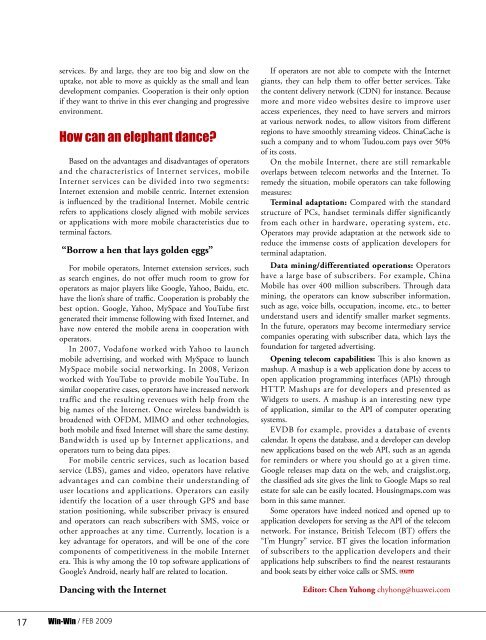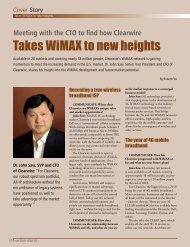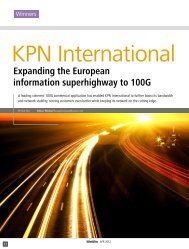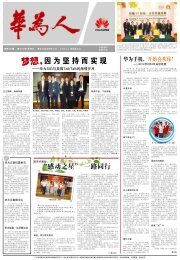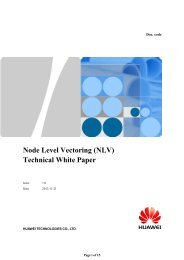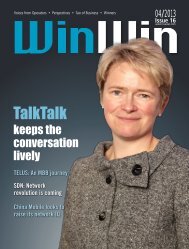EMOBILE: the mobile broadband revolutionist - Huawei
EMOBILE: the mobile broadband revolutionist - Huawei
EMOBILE: the mobile broadband revolutionist - Huawei
Create successful ePaper yourself
Turn your PDF publications into a flip-book with our unique Google optimized e-Paper software.
services. By and large, <strong>the</strong>y are too big and slow on <strong>the</strong><br />
uptake, not able to move as quickly as <strong>the</strong> small and lean<br />
development companies. Cooperation is <strong>the</strong>ir only option<br />
if <strong>the</strong>y want to thrive in this ever changing and progressive<br />
environment.<br />
How can an elephant dance?<br />
Based on <strong>the</strong> advantages and disadvantages of operators<br />
and <strong>the</strong> characteristics of Internet services, <strong>mobile</strong><br />
Internet services can be divided into two segments:<br />
Internet extension and <strong>mobile</strong> centric. Internet extension<br />
is influenced by <strong>the</strong> traditional Internet. Mobile centric<br />
refers to applications closely aligned with <strong>mobile</strong> services<br />
or applications with more <strong>mobile</strong> characteristics due to<br />
terminal factors.<br />
“Borrow a hen that lays golden eggs”<br />
For <strong>mobile</strong> operators, Internet extension services, such<br />
as search engines, do not offer much room to grow for<br />
operators as major players like Google, Yahoo, Baidu, etc.<br />
have <strong>the</strong> lion’s share of traffic. Cooperation is probably <strong>the</strong><br />
best option. Google, Yahoo, MySpace and YouTube first<br />
generated <strong>the</strong>ir immense following with fixed Internet, and<br />
have now entered <strong>the</strong> <strong>mobile</strong> arena in cooperation with<br />
operators.<br />
In 2007, Vodafone worked with Yahoo to launch<br />
<strong>mobile</strong> advertising, and worked with MySpace to launch<br />
MySpace <strong>mobile</strong> social networking. In 2008, Verizon<br />
worked with YouTube to provide <strong>mobile</strong> YouTube. In<br />
similar cooperative cases, operators have increased network<br />
traffic and <strong>the</strong> resulting revenues with help from <strong>the</strong><br />
big names of <strong>the</strong> Internet. Once wireless bandwidth is<br />
broadened with OFDM, MIMO and o<strong>the</strong>r technologies,<br />
both <strong>mobile</strong> and fixed Internet will share <strong>the</strong> same destiny.<br />
Bandwidth is used up by Internet applications, and<br />
operators turn to being data pipes.<br />
For <strong>mobile</strong> centric services, such as location based<br />
service (LBS), games and video, operators have relative<br />
advantages and can combine <strong>the</strong>ir understanding of<br />
user locations and applications. Operators can easily<br />
identify <strong>the</strong> location of a user through GPS and base<br />
station positioning, while subscriber privacy is ensured<br />
and operators can reach subscribers with SMS, voice or<br />
o<strong>the</strong>r approaches at any time. Currently, location is a<br />
key advantage for operators, and will be one of <strong>the</strong> core<br />
components of competitiveness in <strong>the</strong> <strong>mobile</strong> Internet<br />
era. This is why among <strong>the</strong> 10 top software applications of<br />
Google’s Android, nearly half are related to location.<br />
Dancing with <strong>the</strong> Internet<br />
If operators are not able to compete with <strong>the</strong> Internet<br />
giants, <strong>the</strong>y can help <strong>the</strong>m to offer better services. Take<br />
<strong>the</strong> content delivery network (CDN) for instance. Because<br />
more and more video websites desire to improve user<br />
access experiences, <strong>the</strong>y need to have servers and mirrors<br />
at various network nodes, to allow visitors from different<br />
regions to have smoothly streaming videos. ChinaCache is<br />
such a company and to whom Tudou.com pays over 50%<br />
of its costs.<br />
On <strong>the</strong> <strong>mobile</strong> Internet, <strong>the</strong>re are still remarkable<br />
overlaps between telecom networks and <strong>the</strong> Internet. To<br />
remedy <strong>the</strong> situation, <strong>mobile</strong> operators can take following<br />
measures:<br />
Terminal adaptation: Compared with <strong>the</strong> standard<br />
structure of PCs, handset terminals differ significantly<br />
from each o<strong>the</strong>r in hardware, operating system, etc.<br />
Operators may provide adaptation at <strong>the</strong> network side to<br />
reduce <strong>the</strong> immense costs of application developers for<br />
terminal adaptation.<br />
Data mining/differentiated operations: Operators<br />
have a large base of subscribers. For example, China<br />
Mobile has over 400 million subscribers. Through data<br />
mining, <strong>the</strong> operators can know subscriber information,<br />
such as age, voice bills, occupation, income, etc., to better<br />
understand users and identify smaller market segments.<br />
In <strong>the</strong> future, operators may become intermediary service<br />
companies operating with subscriber data, which lays <strong>the</strong><br />
foundation for targeted advertising.<br />
Opening telecom capabilities: This is also known as<br />
mashup. A mashup is a web application done by access to<br />
open application programming interfaces (APIs) through<br />
HTTP. Mashups are for developers and presented as<br />
Widgets to users. A mashup is an interesting new type<br />
of application, similar to <strong>the</strong> API of computer operating<br />
systems.<br />
EVDB for example, provides a database of events<br />
calendar. It opens <strong>the</strong> database, and a developer can develop<br />
new applications based on <strong>the</strong> web API, such as an agenda<br />
for reminders or where you should go at a given time.<br />
Google releases map data on <strong>the</strong> web, and craigslist.org,<br />
<strong>the</strong> classified ads site gives <strong>the</strong> link to Google Maps so real<br />
estate for sale can be easily located. Housingmaps.com was<br />
born in this same manner.<br />
Some operators have indeed noticed and opened up to<br />
application developers for serving as <strong>the</strong> API of <strong>the</strong> telecom<br />
network. For instance, British Telecom (BT) offers <strong>the</strong><br />
“I’m Hungry” service. BT gives <strong>the</strong> location information<br />
of subscribers to <strong>the</strong> application developers and <strong>the</strong>ir<br />
applications help subscribers to find <strong>the</strong> nearest restaurants<br />
and book seats by ei<strong>the</strong>r voice calls or SMS.<br />
Editor: Chen Yuhong chyhong@huawei.com<br />
17<br />
Win-Win / FEB 2009


